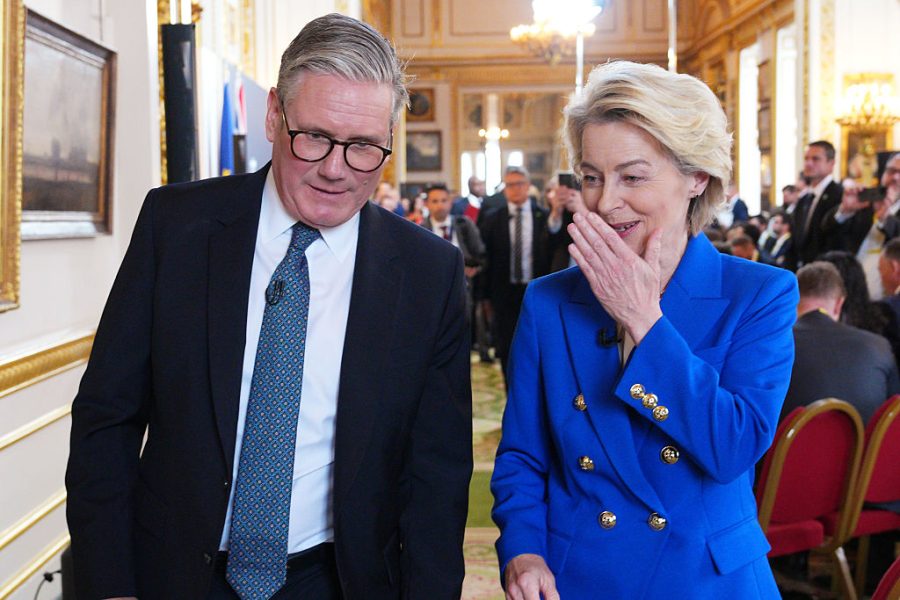The UK-EU summit in London in May was proclaimed as a ‘new chapter’ in the post-Brexit relationship. Only now are we finding out the true cost.
Perhaps the British government should not have so eagerly chased a scheme that was bound to work to our disadvantage
The EU’s Security Action for Europe (Safe) – a fund of €150 billion (£130 billion) to provide loans for member states to undertake urgent, large-scale defence procurement projects – was a key talking point at the meeting. The programme is a sensible one, aimed at boosting the European defence industry’s production capacity. However, it is now clear that the UK will need to pay a fee to participate. The amount has not yet been fixed, but EU diplomats reason that ‘since British businesses would receive EU money to create jobs and expand capacity under the scheme, London should recompense Brussels’. France is said to be pushing for a significant contribution, while others, including Germany, are keen not to set the tariff so high that the UK does not participate at all.
This should come as no surprise. The prima facie terms of the Safe scheme, initially excluding the US and the UK (between them home to ten of the world’s twenty biggest defence contractors), left French and German manufacturers like Thales, Rheinmetall and KNDS at the head of the queue to benefit from new spending. Thales and KNDS, as well as Naval Group and Safran, are, as it happens, part-owned by the French state. In these circumstances, the question of who benefits was not a particularly challenging one.
Surely this wasn’t supposed to happen? At the summit in May, Sir Keir Starmer said that the UK-EU agreement would ‘open the door to working with the EU’s new defence fund – providing new opportunities for our defence industry, supporting British jobs and livelihoods’. That was, I argued at the time, one of the main motivating factors behind the agreement. After all, the rules for Safe make it clear:
Safe will also allow acceding countries, candidate countries, potential candidates and countries that have signed a security and defence partnership with the EU, such as the United Kingdom, to join common procurements.
Alas, there was a brief cautionary note that Britain’s participation would be ‘subject to a separate negotiation and conditions, including a financial contribution from the UK’. The European Commission’s spokesman for defence, Thomas Regnier, told the Financial Times that, under the terms of the agreement, UK-based companies could provide up to 35 per cent of the value of procurement through Safe, but going beyond that would depend on ‘an agreement with the EU on the precise modalities on aspects such as budget contribution and security of supply’.
This was inevitable. The EU is a fundamentally protectionist organisation which seeks to gain as much advantage as possible for the economies of its member states. That is not a criticism, merely an observation: but it has highlighted the disadvantages of pursuing defence policy through the EU, of which we are not a member, rather than Nato, a dedicated military alliance of which we have been part for more than 75 years.
(It is true the overlap between the EU and Nato is not complete: although acting through the latter would include the US, Canada and Turkey, it would exclude the military superpowers of Austria, Ireland, Malta and Cyprus.)
The Cabinet Office has offered bland, reality-defying reassurance: ‘It is in all our interests for the UK and EU to bring together our unique capabilities and expertise to make Europe a safer, more secure, and more prosperous place’. Indeed so, but perhaps that is a message better directed towards the French government, while there still is one.
There have been pious expressions of hope that ‘parochial national interests’ do not undermine Safe’s potential to contribute to Europe’s overall security. But this is the EU, the bare-knuckle fight club of national interests. It has weak defence institutions but strong ambitions to accrete more competencies to the centre. And the hard-edged realpolitik of Brussels is showing the relative emptiness of the clutch of bilateral agreements Starmer has concluded.
There is a clear choice. What is Europe’s overriding priority: building the continent’s defence capabilities or strengthening national defence industrial bases? The rules governing Safe effectively choose the latter; that is a matter for member states. But perhaps the British government should not have so eagerly chased a scheme that was bound to work to our disadvantage. The Strategic Defence Review set out a ‘Nato First’ policy – perhaps we should have focused more closely on that mantra.








Comments